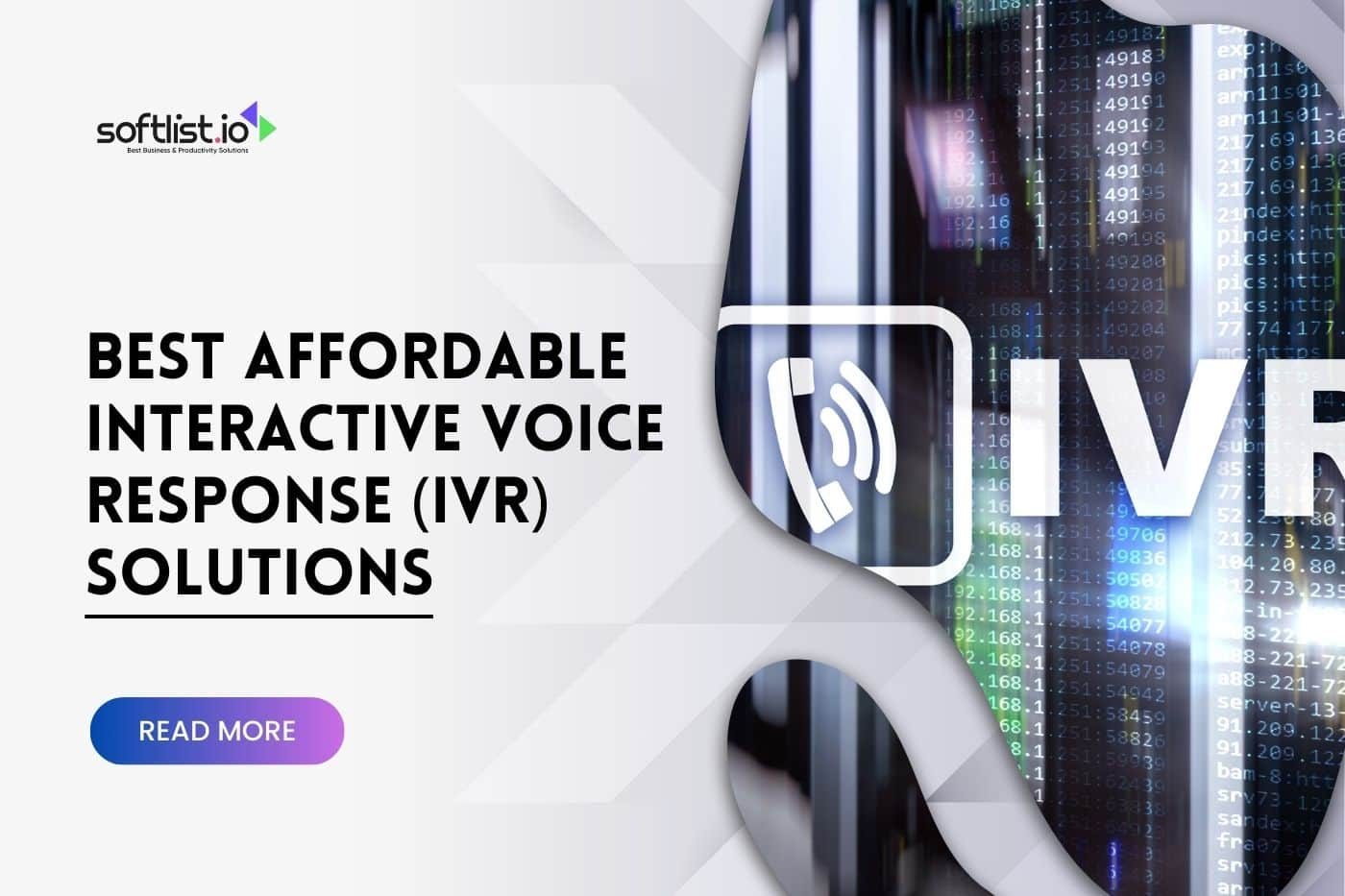Have you ever faced the challenge of managing a bustling e-commerce warehouse where every order feels like a race against time? I have. It was during the holiday rush, a period when my small e-commerce business saw an unprecedented spike in orders.
That’s when I realized the critical role of using an e-commerce warehouse management system in surviving and thriving in the digital market. This experience taught me the importance of choosing the ideal warehouse management system—a decision that can make or break your business’s operational efficiency.
This article will share insights on selecting the perfect e-commerce warehouse management system for your business, acting as your guide to e-commerce warehouse management. We’ll cover:
- Top Features of an Effective WMS: Discover the essential functionalities that can transform your warehouse operations, making the best WMS indispensable.
- Comprehensive Review of 39+ Warehouse Management Systems: Get a brief overview of the best warehouse management software, focusing on features, pricing, and unique benefits.
- Advantages of Cloud-Based Systems: Learn why many businesses move their warehouse operations to the cloud, utilizing e-commerce WMS for enhanced flexibility.
- Choosing the Right System for Your E-commerce Business: Tips on picking a system that aligns with your business size, budget, and specific needs, ensuring you select the management system for your e-commerce that’s best suited for you.
This guide gives you the knowledge you need to make an informed decision, ensuring your warehouse operations are as efficient and effective as possible. Whether you’re a small business owner or manage a large e-commerce operation, integrating a warehouse management system is key to optimizing your processes and driving growth.
Top Features of an Effective WMS
Selecting the right e-commerce warehouse management system (WMS) can transform how you manage your inventory, fulfill orders, and enhance your overall warehouse operations. An advanced WMS system goes beyond inventory level monitoring; it optimizes your entire warehousing strategy, improving efficiency and accuracy.
Here are the key features that distinguish an effective WMS, all aimed at bolstering efficient operations while leveraging cloud-based warehouse management solutions:
- Real-Time Inventory Tracking: Essential for keeping stock levels accurately updated as orders are processed, this warehouse management software feature minimizes discrepancies and supports precise forecasting, acting as the core of inventory visibility and control.
- Automated Reordering: This WMS software function automates purchase orders for low stocks, ensuring sales aren’t lost due to out-of-stock situations, thus saving time and reducing manual errors.
- Cloud-Based Accessibility: Offers access to your warehouse data from anywhere, which is crucial for businesses with multiple sites or those needing remote access to real-time information, highlighting the benefits of warehouse management with cloud technology.
- Integration Capabilities: Essential for creating a unified operation, this warehouse management feature allows for smooth integration with e-commerce platforms, shipping services, and ERP systems, illustrating the components of a good warehouse system that deals with inventory management effectively.
Using a warehouse management system with these standout features is vital for e-commerce businesses looking to improve warehouse efficiency and scale successfully.
Comprehensive Review of 39+ Warehouse Management Systems
In the quest to enhance warehouse efficiency and optimize e-commerce operations, selecting WMS that is best for your business is paramount. This section looks at over 39 WMS solutions with unique features, pricing, and benefits designed to meet various business needs.
From affordable warehouse management tools for small businesses to cloud-based warehouse management solutions for large enterprises, this comprehensive review covers the spectrum to help you find the perfect fit for your operations.
1. QuickBooks Commerce

Source: Intuit Quickbooks
Ideal for small to medium-sized businesses, QuickBooks Commerce offers seamless integration with QuickBooks‘ accounting solutions, streamlining inventory and order management alongside financials.
- Integration with QuickBooks accounting
- Order and inventory management
- Multi-channel sales support
Pros: Easy integration with accounting, user-friendly interface.
Cons: Limited functionality for complex warehouse operations.
View QuickBooks Commerce pricing structure here.
Create and send professional invoices with smart invoicing software. Get payroll done right, and payroll taxes done for you. Whether you’re a new user or pro, get your questions answered with one of our free, live webinars.
2. Zoho Inventory

Source: Zoho
Zoho Inventory excels in automation and integration for small to medium-sized businesses, offering extensive stock management features and multi-channel selling capabilities.
- Real-time inventory tracking
- Automated order management
- Integration with multiple e-commerce platforms
Pros: Highly customizable, excellent for multi-channel retailers.
Cons: Learning curve for beginners.
View the Zoho Inventory pricing structure here.
A unique and powerful suite of software to run your entire business, brought to you by a company with the long-term vision to transform the way you work.
3. Körber Warehouse Edge

Source: Körber
Targeting complex warehousing operations, Körber Warehouse Edge (formerly HighJump) offers scalability and efficiency with advanced automation tools and analytics.
Features:
- Warehouse automation and optimization
- Scalable solutions
- Comprehensive analytics and reporting
Pros: Supports large, complex operations; highly scalable.
Cons: Overwhelming for smaller operations.
View Körber Warehouse Edge pricing structure here.
4. Odoo Inventory

Source: Odoo
Odoo Inventory is part of the Odoo suite, designed for businesses seeking an integrated ERP and stock management approach.
Features:
- Seamless integration with other Odoo apps
- Automated stock adjustments
- Smart reordering
Pros: Integrated ERP solution, highly customizable.
Cons: Best used within the Odoo ecosystem.
View the Odoo Inventory pricing structure here.
5. Fishbowl Inventory

Source: Fishbowl Inventory
Fishbowl Inventory is geared towards small to medium-sized businesses, offering strong inventory control and manufacturing features.
Features:
- Manufacturing and warehouse management
- QuickBooks integration
- Part tracking and work orders
Pros: Comprehensive features for manufacturing and warehousing.
Cons: Interface can be clunky.
View the Fishbowl Inventory pricing structure here.
6. Oracle WMS
Oracle warehouse management system is a cloud solution for large enterprises with extensive global supply chain operations features.
Features:
- Global inventory visibility
- Advanced fulfillment logistics
- Cloud-based scalability
Pros: Powerful for global operations, robust cloud infrastructure.
Cons: High cost, complex implementation.
View Oracle WMS pricing structure here.
7. NetSuite WMS
As part of Oracle’s suite of cloud-based applications, NetSuite WMS offers a comprehensive inventory and warehouse management solution integrated with ERP functionalities.
Features:
- End-to-end inventory and warehouse management
- Mobile RF barcode scanning
- e-commerce integration
Pros: Seamless integration with NetSuite ERP, scalable.
Cons: Pricing may be prohibitive for smaller businesses.
View NetSuite WMS pricing structure here.
8. Infor WMS
Infor WMS is a highly scalable solution designed to handle complex warehousing challenges and is suitable for large enterprises.
Features:
- Labor management and 3D visual warehousing
- Advanced inventory tracking
- Integration capabilities
Pros: Comprehensive features for large-scale operations.
Cons: Can be complex to implement.
View Infor WMS pricing structure here.
9. Microsoft Dynamics 365 Supply Chain Management
This solution offers comprehensive management of supply chain processes, integrating advanced analytics and AI to optimize operations.
Features:
- AI-driven insights
- Inventory and order management
- Supply chain planning and analytics
Pros: Deep integration with other Microsoft products and advanced analytics.
Cons: Complexity and cost may deter small businesses.
View Microsoft Dynamics 365 pricing structure here.
10. Tecsys
Tecsys is designed for complex operations, offering a comprehensive suite of supply chain management solutions.
Features:
- Wide-ranging supply chain management
- Detailed analytics and reporting
- Scalable cloud platform
Pros: Excellent for complex logistics and healthcare supply chains.
Cons: May be more than needed for simpler operations.
View Tecsys’ pricing structure here.
11. Manhattan Associates
Manhattan Associates specializes in supply chain and omnichannel commerce solutions, providing powerful tools for large enterprises.
Features:
- Omnichannel fulfillment
- Inventory optimization
- Integrated supply chain solutions
Pros: Advanced features for omnichannel and large enterprises.
Cons: Implementation can be resource-intensive.
View Manhattan Associates’ pricing structure here.
12. Deposco
A cloud-based solution for retailers, wholesalers, and logistics providers aiming for growth and scalability.
Features:
- Cloud-based flexibility
- Comprehensive order management
- Advanced analytics
Pros: Highly scalable, great for mid-sized businesses.
Cons: This may require additional customization for specific needs.
View the Deposco pricing structure here.
13. Katana
Katana focuses on real-time inventory and production management, perfect for manufacturers and online sellers.
Features:
- Real-time inventory management
- Seamless integration with e-commerce platforms
- Visual production planning
Pros: User-friendly, excellent for small to medium manufacturing businesses.
Cons: Limited functionality for large-scale warehousing.
View Katana’s pricing structure here.
14. Acumatica
Offers a comprehensive suite of cloud-based ERP and WMS solutions for businesses of all sizes.
Features:
- Integrated ERP and WMS
- Customizable dashboards
- Scalable cloud infrastructure
Pros: Flexible and fully integrated system.
Cons: Implementation and customization can be complex.
View the Acumatica pricing structure here.
15. SAP ERP
A powerful ERP solution with extensive WMS capabilities for large enterprises and complex operations.
Features:
- Comprehensive ERP integration
- Advanced analytics and reporting
- Global supply chain management
Pros: Robust and scalable for global operations.
Cons: Complexity and cost may be prohibitive for smaller businesses.
View the SAP ERP pricing structure here.
16. Infoplus WMS
Tailored for small to medium-sized businesses, Infoplus offers simple yet powerful warehouse and inventory management.
Features:
- Easy order and inventory management
- Customizable workflows
- Third-party logistics (3PL) support
Pros: Flexible and affordable for SMBs.
Cons: May lack advanced features for larger operations.
View Infoplus pricing structure here.
17. Increff WMS
Designed for fashion and lifestyle brands, Increff WMS provides smart warehousing solutions to improve inventory accuracy and order fulfillment.
Features:
- High inventory accuracy
- Improved order fulfillment rates
- Cloud-based accessibility
Pros: Specialized for retail sectors, user-friendly.
Cons: Niche focus may not suit all industries.
View Increff pricing structure here.
18. Vin eRetail
Offers a suite of solutions for e-commerce businesses, including order management, inventory management, and fulfillment across multiple channels.
Features:
- Multi-channel integration
- Order and inventory management
- Returns management
Pros: Excellent for e-commerce retailers, supports multiple sales channels.
Cons: Integration complexity with existing systems.
View Vin eRetail pricing structure here.
19. Agiliron
Agiliron is designed to help businesses manage sales across multiple channels from a single platform, including warehouse management capabilities.
Features:
- Multi-channel sales management
- Inventory and order management
- POS and CRM integration
Pros: Comprehensive suite for multi-channel retailers.
Cons: Learning curve for new users.
View Agiliron’s pricing structure here.
20. Blue Yonder Luminate Logistics
A next-generation supply chain platform that uses AI and ML to predict and prevent disruptions, optimizing warehousing and logistics operations.
Features:
- AI-driven forecasting and planning
- Real-time visibility and insights
- Scalable cloud platform
Pros: Advanced technology for predictive analytics and optimization.
Cons: May be complex for small businesses.
View Blue Yonder’s pricing structure here.
21. InFlow Inventory
Aimed at small to medium-sized businesses, InFlow Inventory specializes in inventory management, order fulfillment, and reordering.
Features:
- Inventory tracking and control
- Order management
- Reporting and analytics
Pros: Affordable and user-friendly.
Cons: Limited scalability for larger operations.
View the InFlow Inventory pricing structure here.
22. Naveo Connected Commerce
Naveo Connected Commerce provides an integrated platform to unify e-commerce and brick-and-mortar operations, streamlining inventory management, order fulfillment, and customer experiences.
Features:
- Omnichannel inventory management
- Real-time data synchronization across sales channels
- Advanced order management and fulfillment strategies
Pros: Offers a seamless integration of online and offline sales channels; enhances customer shopping experience.
Cons: Complexity of setup for businesses new to omnichannel retailing.
View Naveo Connected Commerce pricing structure here.
23. Finale Inventory
Ideal for SMBs, Finale Inventory offers cloud-based solutions for inventory management, order processing, and multi-channel sales management.
Features:
- Real-time inventory tracking
- Multi-channel sales integration
- Comprehensive reporting tools
Pros: Intuitive and easy to use; great for small to medium businesses.
Cons: May lack some advanced features for larger operations.
View the Finale Inventory pricing structure here.
24. Magaya Supply Chain
Magaya Supply Chain is designed to streamline operations across logistics, warehousing, and inventory management, suitable for logistics providers and freight forwarders.
Features:
- Comprehensive supply chain management
- Warehouse and cargo management
- Customizable workflows
Pros: Comprehensive solution for logistics and freight industries.
Cons: Learning curve and complexity for newcomers.
View Magaya Supply Chain pricing structure here.
25. Pulpo WMS
Pulpo WMS offers solutions for SMBs to optimize warehouse operations, focusing on simplicity and efficiency.
Features:
- Simple and intuitive interface
- Inventory and order management
- Integration capabilities
Pros: User-friendly for small businesses; affordable.
Cons: Limited advanced features for scaling.
View Pulpo WMS pricing structure here.
26. Fulcrum
Targeted at enterprises requiring robust warehousing and distribution solutions, Fulcrum provides comprehensive tools for managing complex supply chains.
Features:
- Advanced inventory management
- Real-time data and analytics
- Scalable cloud platform
Pros: Powerful for large, complex operations.
Cons: May be overly complex for small operations.
View Fulcrum’s pricing structure here.
27. Sku Savvy
Sku Savvy is designed for e-commerce businesses looking for an easy-to-use, scalable solution for inventory and order management.
Features:
- E-commerce integration
- Inventory management
- Order processing and fulfillment
Pros: Simple, intuitive, and great for startups and small businesses.
Cons: Limited functionality for larger enterprises.
View Sku Savvy’s pricing structure here.
28. Brightpearl
Brightpearl caters to retail and wholesale businesses, offering a comprehensive suite of features for inventory, order, and sales management across multiple channels.
Features:
- Multi-channel retail management
- Real-time inventory tracking
- Accounting and Reporting
Pros: Integrated solution for retail and wholesale operations.
Cons: Pricing and complexity may challenge small businesses.
View Brightpearl pricing structure here.
29. Acctivate Inventory Management
Acctivate provides powerful inventory management tools designed for small to medium businesses, integrating seamlessly with QuickBooks.
Features:
- Inventory control and tracking
- Business management and insights
- Multi-channel order management
Pros: Strong integration with QuickBooks; good for SMBs.
Cons: May require additional modules for full functionality.
View the Acctivate Inventory Management pricing structure here.
30. DEAR Systems
DEAR Systems offers a comprehensive inventory and order management solution designed for small to medium-sized businesses, focusing on integration and automation.
Features:
- Seamless integration with e-commerce platforms
- Automated order fulfillment and inventory tracking
- Detailed analytics and reporting
Pros: Highly integrative with major e-commerce platforms; robust automation features.
Cons: The depth of features might overwhelm new users.
View DEAR Systems’ pricing structure here.
31. Wasp Inventory Control
Tailored for small businesses, Wasp Inventory Control provides a straightforward solution for tracking stock levels, orders, and shipments.
Features:
- Barcode-based inventory tracking
- Audit and reporting capabilities
- Simple order management
Pros: User-friendly for small businesses; cost-effective.
Cons: Limited scalability for growing businesses.
View the Wasp Inventory Control pricing structure here.
32. ShippingEasy
ShippingEasy is an all-in-one shipping, inventory, and order management platform ideal for e-commerce businesses looking to streamline their fulfillment processes.
Features:
- Integrated shipping solutions
- Inventory management
- Multi-channel order synchronization
Pros: Simplifies shipping and inventory management; excellent for online retailers.
Cons: Focuses more on shipping than deep warehouse management.
View ShippingEasy pricing structure here.
33. Sortly
Sortly is a highly visual, intuitive inventory management system designed for small to medium-sized businesses needing a simple organization solution.
Features:
- Visual inventory tracking
- QR code and barcode scanning
- Customizable tags and folders
Pros: Extremely user-friendly with a visual approach to inventory.
Cons: May lack advanced warehouse management features for larger operations.
View the Sortly pricing structure here.
34. Astro WMS
Astro WMS provides a comprehensive, scalable solution for complex warehousing needs, focusing on efficiency and adaptability.
Features:
- Advanced warehouse operation optimization
- Real-time inventory management
- Customizable workflows and interfaces
Pros: Highly customizable; supports complex and high-volume operations.
Cons: Requires investment in setup and training.
View Astro WMS pricing structure here.
35. SphereWMS
SphereWMS offers cloud-based warehouse management solutions designed to streamline operations, offering real-time visibility and control over inventory and shipments.
Features:
- Cloud-based accessibility and data management
- Order management and fulfillment
- Returns management system
Pros: Good for businesses of all sizes looking for cloud solutions.
Cons: Customization and integration may require additional effort.
View SphereWMS pricing structure here.
36. ShipBob
ShipBob is tailored for e-commerce businesses seeking end-to-end fulfillment services, from warehousing to shipping.
Features:
- E-commerce integration
- Distributed inventory management
- Order fulfillment and shipping services
Pros: Complete fulfillment solution; ideal for e-commerce.
Cons: Less control over individual warehouse operations.
View ShipBob pricing structure here.
37. Cadence WMS
Cadence WMS is designed for enterprises requiring robust logistics and supply chain management solutions, offering extensive customization.
Features:
- Comprehensive supply chain logistics
- Customizable workflows and processes
- Integration with ERP systems
Pros: Highly customizable; supports complex operations.
Cons: May require a longer setup and implementation period.
View Cadence WMS pricing structure here.
38. 3PL Warehouse Manager
Specifically designed for third-party logistics providers, 3PL Warehouse Manager offers features to manage multiple clients in a single, scalable system.
Features:
- Multi-client inventory management
- Billing and invoicing for 3PL services
- Comprehensive reporting and analytics
Pros: Tailored for 3PL providers; supports multi-client operations.
Cons: Focused primarily on 3PL businesses, which may not suit all users.
View the 3PL Warehouse Manager pricing structure here.
39. Blue Link ERP
Blue Link ERP offers an integrated inventory management and accounting ERP system for wholesale and distribution businesses.
Features:
- Integrated inventory and accounting
- Order entry and processing
- CRM and contact management
Pros: Comprehensive ERP solution; good for wholesalers and distributors.
Cons: This may require significant investment in training and implementation.
View Blue Link ERP pricing structure here.
By providing an in-depth look at a wide range of WMS solutions, this section aims to equip readers with the knowledge to choose a system that meets their current operational requirements and supports future growth and scalability.
Advantages of Cloud-Based Warehouse Management

Source: Freepik
The transition to cloud-based warehouse management systems (WMS) represents a pivotal change in inventory and logistics management, offering the benefits of a warehouse management system that significantly enhances operational efficiency and scalability.
These systems streamline your warehouse operations by providing the following:
- Scalability: They adapt effortlessly to business growth or seasonal changes, ensuring cost-efficiency by charging only for the required capacity.
- Reduced IT Costs: These solutions cut down on significant capital and maintenance expenses by eliminating the necessity for onsite hardware.
- Enhanced Accessibility: Granting real-time inventory management from any location globally, cloud-based WMS supports remote management capabilities.
- Automatic Updates: With automatic updates, cloud providers keep the management software to streamline operations up-to-date with the latest features and security protocols, ensuring minimal disruption to business activities.
This cloud-based approach optimizes operations and provides the agility and efficiency vital for succeeding in the dynamic e-commerce environment.
How to Choose the Right WMS for Your E-commerce Business

Source: Freepik
Selecting the ideal warehouse management system is crucial for e-commerce businesses today, aiming to enhance their operations and customer satisfaction.
To ensure you make a choice that’s best suited for your business, consider the following:
- Assess Your Business Size and Volume: Opt for a WMS that not only meets your current needs but also has the capacity to scale as your e-commerce brand grows.
- Consider Your Budget: Find a balance between the essential functionalities you require and your budget, with an eye on long-term ROI to improve e-commerce logistics.
- Identify Specific Needs: Look for features that cater to the unique needs of e-commerce, such as multi-channel integration and advanced reporting, to ensure the system integrates with your e-commerce platform effectively.
- Research and Compare: Conduct thorough comparisons of systems to discover which solutions are most effective, as this research helps e-commerce businesses navigate the complexities of e-commerce logistics.
By adhering to these guidelines, you can choose a WMS that not only aligns with your current operations but also supports the future growth and success of your e-commerce store.
Key Takeaway
The right ecommerce warehouse management system (WMS) not only boosts operational efficiency and scalability but also significantly enhances customer satisfaction, embodying best practices in the management process.
Utilizing a WMS offers the benefits of using an e-commerce platform by providing flexibility, cost savings, and supporting complex logistics, thus improving the accuracy of warehouse operations.
The continuous evolution of WMS technologies promises enhanced integration, automation, and analytics, empowering e-commerce businesses to thrive in a dynamic market.
E-commerce warehouse management helps streamline processes, and we invite you to share your experiences or inquiries about WMS selection and implementation in the comments to promote a culture of learning and innovation.
FAQs About ECommerce Warehouse Management Systems
How do WMS solutions integrate with other e-commerce platforms?
WMS solutions integrate with ecommerce platforms using APIs (Application Programming Interfaces) or middleware, enabling seamless data exchange on inventory levels, order status, and shipping details. This integration facilitates automated order processing and inventory updates, enhancing platform operational efficiency.
Can warehouse management systems improve customer satisfaction?
Yes, warehouse management systems significantly improve customer satisfaction by ensuring accurate, timely order fulfillment and reducing errors in shipping. Enhanced inventory visibility and control also lead to faster delivery times, positively impacting customer satisfaction.
What is the average implementation time for a warehouse management system?
The average implementation time for a warehouse management system can vary from a few weeks to several months, depending on the system’s complexity and the business’s specific needs. Cloud-based WMS typically offer quicker deployment times compared to traditional, on-premise systems.
How do WMS solutions handle returns and exchanges?
WMS solutions streamline returns and exchanges by automating receiving returned items, updating inventory levels, and processing exchanges or refunds. They ensure accurate, efficient handling of returns, minimize losses, and enhance customer service.
What are the latest trends in warehouse management technology?
The latest trends in warehouse management technology include using AI and machine learning for predictive analytics, adopting IoT devices for real-time inventory tracking, and implementing robotics and automation to improve operational efficiency and reduce manual labor.
Make Smart Choices for Your Warehouse with Softlist
Choosing the right warehouse management system is not just about enhancing operational efficiency; it’s about ensuring your e-commerce venture can meet the demands of today’s dynamic market. At Softlist, we aim to arm you with comprehensive insights and detailed analyses, empowering you to make informed decisions that drive your business forward.
We invite you to delve deeper into the tools discussed in this article, explore more sections of our website for invaluable insights, or reach out to us for personalized recommendations tailored to your unique operational needs.
Remember, when you select software like management software through our recommendations, you’re optimizing your business operations and supporting the Softlist mission, helping us continue providing a wealth of resources as an affiliate website.







